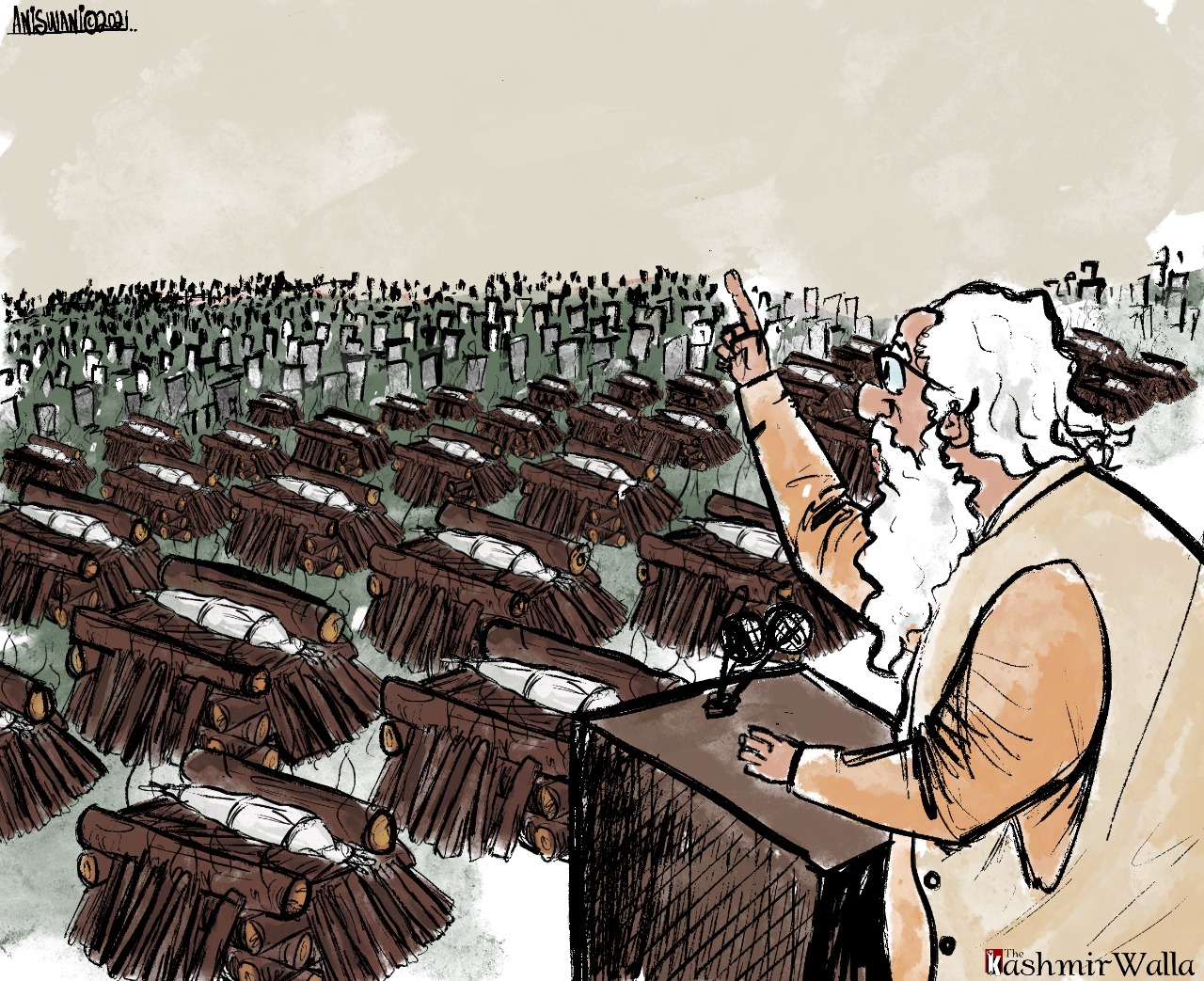Although much of the world is preparing to move past the Covid-19 pandemic, with large immunization programs and the reopening of economic activity, there is one country that has, since the beginning of 2021, gazed into the mouth of hell and dived headfirst into plague-infested anarchy: the BJP-run Republic of India. For all of the bravado that India has been conjuring up for two decades, whether about its economic strength, cultural or intellectual superiority, or even its military muscle, it is now nearly alone in the world in terms of breeding the cesspool of Covid-18, in what immunologists call the “Delta variant.” This variant is the product of a monumental hubris, ignorance, and fetish for the performative over the substantive, and it may well be the most damning indictment of the BJP and the death cult it has birthed: 30 million cases and 350,000 deaths as of now, if one believes the official statistics – and nobody does.
No one in India or overseas would fall for the official figures posited by the Indian government because of the magnitude of state-sponsored deception it undertakes, along with its rabid suppression of statistics and dissent, and then of course with the impossibility of properly tallying the teeming mass of bloated corpses floating in its rivers and rotting in its fields. The people of India are being hurled into an unspeakable doom spiral, with economic activity upturned and lives torn asunder. The mismanagement, denial and dishonesty of the Modi government during the Covid-19 pandemic is perhaps the final blow in a series of horrific acts that include, at the very least: the illegal annexation of IIOJK on August 5, 2019; the failed demonetization agenda; the anti-poor farmer bills; the false flag Pulwama War; the discriminatory Citizenship Amendment Act; and then the Indian failure during Covid-19 as its coup de grâce.
No longer is the world impressed by India’s self-styled ambitions as a “world power,” or even more obscenely: a “world teacher” (Vishwaguru). They are beginning to see it for what it is: an extra-large tin-pot banana republic. Although the acolytes of Hindutva are still afraid to admit the failures that make them essentially stand alone now in the world, the Indian public has gone through so harrowing an epidemiological experience that they too are beginning to express some cynicism about what the “Vishwaguru” could teach the world, except for steering clear of India and everything it is doing. Its economy remains in the doldrums, its actual death figures are unknowably high, and its international repute is now better aligned with its realities, so to speak.
Looking back at a wider historical context, one must note that large empires were sometimes referred to as the “sick men” of their region as they approached their demise. The Ottoman Empire was the “Sick Man of Europe” when the European colonial predators began to feast on its flesh, and the Qing Empire was the “Sick Man of Asia” when they did so to China. “Sick men” were allusions to a systemic illness eroding the legitimacy and power of imperial centres. Today, India is by all accounts the “Sick Man of Asia,” with the double-entendre of its crumbling imperial fantasies on the one hand, and the actual fetid sickness of coronavirus coursing through its veins on the other. In a dual sense, this Sick Man of Asia is getting the reality check its pundits needed.
Yet in the modern geopolitical and geoeconomic context, the American establishment has for more than a decade sought to prop up a narrative that India will rise as a bulwark against an ascendant China. This language of pairing “China and India” went straight to the head of Delhi’s punditry-class, who actually thought that they were (nearly) ready to take China head-on in every domain. The Galwan Valley standoff helped to quell some of that hubris, but Indians nevertheless thought of themselves as a country that was at least in China’s league; certainly not to be compared anymore to a smaller neighbor like Pakistan or Bangladesh. Yet as India has continued its trip to hell in a handbasket, it is in fact facing the reality that both of these neighbors are doing better than it is, particularly in the Covid-19’s context. Bangladesh’s GDP per capita has overtaken India, while the India-Pakistan standoff of 2019 and the battle-ready professionalism of the Pakistan Air Force (PAF) gave India a firm and “swift retort”; hence the name of the PAF’s successful operation to neutralize Indian aggression.
The American establishment must take stock of their fantasies to prop up India with a dose of sobriety. In the ragtag collection known as “the Quad,” which harbors designs against Beijing and includes minor players such as Canberra, Delhi appears to be entirely incapable of shouldering the burden expected of it in countering Beijing’s consistently rising clout. Beijing and Delhi are not even in the same league, and perhaps nor are Islamabad and Dhaka in the league of the shriveling husk that is left of Delhi, particularly if the Delta variant is yet to mutate into something still worse (which it well might).
Is this country, the Sick Man of Asia, really the ally that Washington expects will lead the charge in Asia-Pacific? Perhaps Washington, and the world at large, need to definitively reevaluate the realities and the expectations that can be conferred upon the Sick Man of Asia.
Dr. Usman W. Chohan is the Director for Economics and National Affairs at the Centre for Aerospace and Security Studies (CASS). This article was first published in Pak Observer. He can be reached at [email protected].
Image Source: Naqash, Rayan. “India can’t breathe but Modi won’t admit to failures,” The Kashmir Wala. April 28, 2021.





